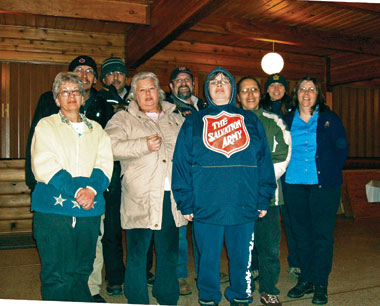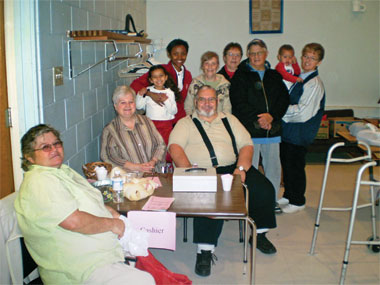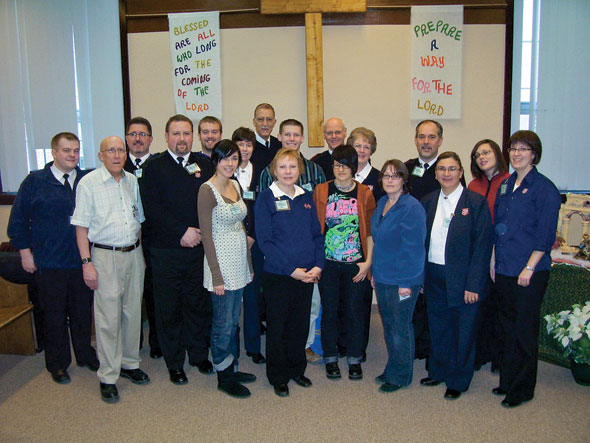
Night Out at TIMS
Three hours north of Saskatoon, Meadow Lake, Sask., is a city of 5,000 people, nearly half of whom are First Nations and Métis. Logging, agriculture and mining are prominent industries, and hunting, fishing and trapping are prevalent in the Meadow Lake provincial park and surrounding area.
The corps in Meadow Lake has existed for 73 years, and it is The Salvation Army's only representation in northwest Saskatchewan. Although officially named a city in November 2009, Meadow Lake is a small community where everybody knows each other.
“Small town ministry is incarnational ministry,” explains Major Karen Eason, corps officer. “It is rewarding and demanding at the same time.”
Meadow Lake was the first appointment for Majors Peter and Karen Eason in 1986, and two and a half years ago, they returned. “It was surreal to come back after all of these years,” explains Major Peter Eason, corps officer. “We discovered that there were very few people left; most of them being quite elderly. We have a passion for the poor and the marginalized, so we decided to go look for them.”
In talking with other pastors in the community, the Easons realized that there were many who were reaching out to young families and people of means, so the corps decided to minister to those who wander the streets, live in the bush, have addictions issues or couch-surf from house to house without ever finding a home. They started a Friday-night street ministry and drop-in, where people come for a devotional, games and laughter from 9 p.m. until midnight. At some point in the night, a van is packed up in order to search the bushes and the streets for people who might need a meal or a warm drink.
TIMS Night is popular at the corps. Meadow Lake does not have a Tim Hortons, so it is “imported” by The Salvation Army and served at this Bible study/support group/prayer meeting hybrid. “This Is My Story” (TIMS) is a chance for people to tell their stories and receive discipling and encouragement. Coffee is also served at Sally Ann's Coffee Nook, a coffee shop at the front of the thrift store. People pay a donation of 25 cents for fair trade coffee, and have a place where they can settle their minds and meet new friends.
Photo: Members of the corps in Meadow Lake, Sask., engage in evening outreach activities
Courage in Adversity
Grace Haven in Regina is a home for 16- and 17-year-old pregnant and parenting young women who do not have family to live with. Most of the teens who come to Grace Haven are at risk of having their children removed from their care by child welfare services, but The Salvation Army is a safe environment where young women can gain confidence in their ability to parent. Life-skills programming includes lessons on healthy relationships, domestic abuse, appropriate play and toys, and shaken baby syndrome. Staff members make sure the girls are going to school, connect them with resources and liaise with their social workers. There is an emphasis on the girls' strengths as well as opportunity to help them with their weaknesses.
From the DC's Desk:
The new Prairie Division, with its headquarters in Winnipeg, represents a comprehensive expression of a wide variety of Salvation Army ministries and services. The Army's mission is effectively being carried out across the widespread, colourful prairies of this great country in a multiplicity of ways by dedicated and competent officers, lay Salvationists, employees and volunteers. This vast geographic area includes the provinces of Saskatchewan and Manitoba, and a northwestern portion of Ontario. It takes in three major cities as well as a significant number of rural communities spread out in all directions of the compass.
People's lives are being touched day after day. Every week in our corps/churches and social services centres, the gospel of Jesus is being preached. Young and old are being discipled in their faith. Needy families are being helped. Homeless persons are being sheltered, fed, supported and encouraged to feel at home among us. The elderly are receiving the highest quality of personal care. Mentally and physically challenged persons are being guided and coached towards a better quality of life. Low-income families are finding a welcoming place to purchase needed items with dignity and respect. And through the excellent work of our public relations and development department, more supporters are choosing to partner with us in these meaningful ministries.
We are working together towards “Giving Hope Today” and sharing the best news about hope for eternity through Jesus Christ our Saviour and Lord.
Please pray for and with us to this end.
—Major Junior Hynes, Divisional Commander
“These young women refuse to give up and give in. This is an amazing skill for life, because when they face adversity, they continue to move forward,” says Lieutenant Lynda Wakelin, executive director.
Gemma House is a place where 12- to 15-year-old girls who have emotional troubles or behavioural difficulties can live for four to six months. Girls living at the facility are at risk of gang involvement, human trafficking and prostitution. Life at Gemma House aims to educate and protect them from exploitation. The program can accommodate six girls at a time, and they usually come through foster care or group homes. The girls are in school during the day, but there are planned activities in the evenings, including teaching modules on life skills, health, relationships and dealing with stress. In addition to swimming and exercises at a local recreation centre, the girls participate in activities in the community such as trips to the library or science centre. The girls are also connected to a church youth group in the city.
“The girls have been through a lot of emotional trauma, but you can see their desperation for love as well as their amazing compassion and forgiveness. We want to help them smooth out their rough edges without breaking their spirits,” says Lieutenant Wakelin.
Neighbours Helping Neighbours
 Cadets Jeff and Graciela Arkell spend Mondays and Tuesdays studying at the College for Officers' Training in Winnipeg and the rest of their time as corps officer and community and family services officer in Portage La Prairie, Man. Portage La Prairie is a city of about 13,000 people located in the central plains, one hour west of Winnipeg. Tree planting, farming, agriculture and the world's largest Coca-Cola can are all found there.
Cadets Jeff and Graciela Arkell spend Mondays and Tuesdays studying at the College for Officers' Training in Winnipeg and the rest of their time as corps officer and community and family services officer in Portage La Prairie, Man. Portage La Prairie is a city of about 13,000 people located in the central plains, one hour west of Winnipeg. Tree planting, farming, agriculture and the world's largest Coca-Cola can are all found there.
“Because of our previous studies at Booth College and our experiences working for The Salvation Army in Canada and Panama, CFOT approached us about taking on a corps as part of our second year of training,” explains Cadet Jeff Arkell. “This type of flexible training is very hands-on and busy, but one of the benefits is that we get to enjoy two worlds.”
The corps' food bank is very active and staffed by volunteers. Tables are set up in the gym so that people can socialize, build relationships and have coffee while they wait for their food. Once a month, a dietician from the regional health authority demonstrates how to prepare meals with some of the food that clients receive in their food hamper and give samples. The corps also has a community services program where people who are charged and convicted can work off their fines through volunteer placements at the corps and in the community. Some people pack food or do bread pickups for the food bank while others sort toys for Christmas or do yard work, but all feel they are working together to give back to the community.
Neighbours Helping Neighbours is a partnership between The Salvation Army and Manitoba Hydro. People who come to the Army for help can qualify for relief assistance to ensure their hydro is not cut off.
The women's group incorporates professional women from the community. “When we have contact with the nurses and social workers who our clients and corps members see, we invite them to the women's group,” explains Cadet Graciela Arkell. “The group gives women in our community the chance to break down the barriers between workers and clients and just be women in fellowship.”
In addition to leading corps activities such as prayer meetings, Sunday school, youth outings, Bible studies, monthly fellowship lunches and a Friday-night coffee house, the Arkells record a weekly radio program, which includes a selection of Salvation Army and other Christian music and a spiritual reflection.
Photo: The ministry at Portage la Prairie, Man., focuses on neighbours helping neighbours

Letting Grace and Faith Balance the Scales
The Salvation Army's correctional and justice services in Winnipeg is multidimensional, but the core ministry is chaplaincy in correctional facilities. A Salvation Army chaplain leads chapel services and Bible studies on a weekly basis at Stony Mountain (the federal prison), Headingley (the provincial prison), Rockwood (a minimum security prison) and Remand Centre (where people are waiting for court). Chaplaincy services are also offered elsewhere when requested.
In addition to formal programming, visitation and counselling for inmates is offered, as well as support for staff. “It is interesting to see how spiritually open inmates are, and how spiritually open the corrections system is,” says Dianna Bussey, director. Along with spiritual services and listening ears, chaplains accept material requests, such as shoes or clothes, for someone about to exit the system. The corps in Winnipeg offer support through volunteers and donating needed items.
Correctional and justice services has an office at the law courts building that offers people a trusted place to get answers and support. Sometimes the chaplain sits with family members during court proceedings or helps people connect with resources such as lawyers. The Salvation Army also assists offenders in reconnecting with their families and communities in the difficult transition back to life after prison.
Other programs include:
• Diversion programs are a partnership with Manitoba Justice–Prosecutions, who refer people with certain criminal charges to The Salvation Army. Those who accept responsibility for their crime can complete a diversion program and have their charge dismissed.
• The Positive Lifestyle Program teaches life skills such as stress management, assertiveness and conflict management to those who have summary charges, which could include shoplifting, mischief, fraud or joyriding.
• The Anger Management Program is for those with charges such as assault or road rage.
• The Prostitution Offender Program is for people charged for trying to buy sex.
• The Prostitution Diversion Program is for those charged with selling sex. It involves a three-day stay in a camp setting where Salvation Army staff build relationships with the women, men and transgendered people involved.
• The Fine Option and Community Service Work Program is a contract with Manitoba Corrections. The Salvation Army is the Community Resource Centre for the core area of Winnipeg, meaning that people who have been given fines of community hours for Criminal Code offences can register with the Army to receive a placement where they can work their community hours. Some placements are at Booth Centre or Weetamah Corps, while others are at partner community centres and food banks. Sometimes these sites are so pleased with the volunteer work that they hire the offenders after their community hours are completed.
The Salvation Army's correctional and justice services has a reputation with the government for motivating, supporting and encouraging people who have been part of the justice system. “Staff in our office are always conscious of not judging and not making people feel like criminals,” says Bussey. “We show grace and have faith that people really can change.”
Photo: Corrections staff, volunteers and CFOT staff and cadets in the Headingley Correctional Centre chapel after distributing Christmas sunshine bags

FAST FACTS
• Covering 1,825,986 square kilometres, the Prairie Division serves Canadians in three provinces
• In July 2009, as a result of territorial restructuring, the Prairie Division was formed to oversee ministry units in Saskatchewan, Manitoba and Northwestern Ontario. The two regions, Saskatchewan and Manitoba/Northwest Ontario, each have their own area commander
• The Salvation Army has been in Winnipeg since 1886, in Regina since 1895, and in Saskatoon since 1905
• There are 35 ministry units in the division, including long-term care homes, youth services (including teen parenting support) and correctional and justice services. Twenty-three corps operate community and family services, 18 corps have thrift stores
• Emergency disaster services operate six community response vehicles in the division and spent a significant amount of time assisting with the Red River floods in the spring of 2009
• Within Winnipeg there is a mix of both divisional and territorial units, as William and Catherine Booth College, the College for Officer Training and the Ethics Centre are all located there, along with national recycling operations and regional accounting
• Four Salvation Army chaplains minister at the Grace Hospital in Winnipeg
• The divisional camp, Beaver Creek Camp, is located just outside of Saskatoon
• Last year 600,000 meals were served to people in communities in the division
• There are 63 officers in the Prairie Division, with an additional 15 serving in territorial appointments. There are also two cadets serving in corps
leadership
• The Booth Centre in Winnipeg opened an isolation unit to assist homeless who may become sick with the H1N1 flu
Click here to read other divisional profiles in this series.









Comment
On Sunday, June 10, 2018, Renee Horton (Moose Jaw Salvation Army Citadel} said:
Leave a Comment